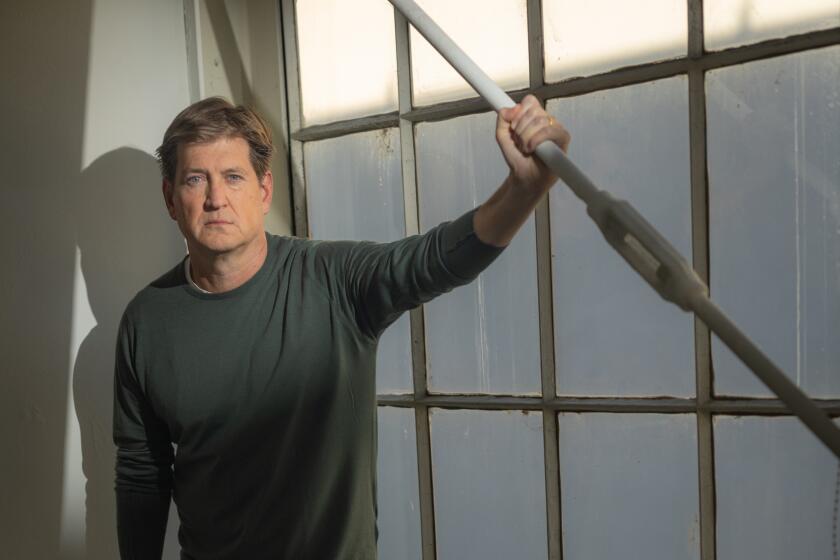A Welcome Letter From Distant Past
We are all instinctively collectors, and the temptation to hang onto anything that has been even minutely significant to us is overpowering. And so, periodically, when there is no longer any room to store things, we clean out the accumulation--and then start all over again.
When I decide to clean out, I usually take no prisoners. Everything goes. The alternative is to find oneself sitting and reading and dreaming over each scrap of paper and faded picture until they become precious all over again and simply can’t be destroyed. But there’s also an enormous risk in tossing out indiscriminately. For example, it has occurred to me frequently in recent months that if I had kept my baseball card collection, alone, I’d be independently wealthy.
But that thought became downright frivolous a few days ago when I almost threw away something of priceless value. I was going rapidly through a box of old clippings and magazines and documents, preparatory to throwing them out, when from the folds of a dog-eared magazine fell a tiny, faded blue notebook that I recognized instantly. It was my grandfather’s Civil War diary that my mother had given me many years ago and that I had somehow misplaced and feared I had lost.
I clutched it with enormous gratitude and sat down instantly to leaf through it. It covers a rather brief period in 1864 when my grandfather was fighting with Gen. Sherman in Georgia and is written in a tiny, fading script difficult to read. So I was feeling rather than reading it, taking it in through my skin, riffling the pages, when I made another glorious discovery. The first page of a yellowed letter fell out of the book into my lap. I had never seen it before.
It was headed, “U.S.A. General Hospital No. 3, Lookout Mt. Tennessee,” and it was dated “April the 7th, 1865.” It was addressed to “Sophia Beery,” the maiden name of my maternal grandmother. And it was a love letter. A tender and poignant love letter.
“It has been a long time,” wrote my grandfather, “since I heard from you. I expect you didn’t get my last letter. If you had, I think I should have heard from you some time ago. . . . When I get a letter from you, it brings back to memory the happy hours I spent with you last Fall and it brightens my mind with a new hope that I may have the privilege of spending a few more happy hours in the future with the one I admire.
“Oh how my heart would beat with joy if I knew you loved me as I love you. You must excuse me for writing so plain on this subject. I wouldn’t be so bold if I thought anyone else would see my letters but you. I believe you have more respect for me than to show my letters to anyone.
“Sophia, if it should be the case that you are tired of corresponding with someone who loves you, for my sake show no person my letters. Not that I care who knows I love you for I am certain it is no disgrace to love as good and nice a girl as you are. It would be an honor, if anything. Sophia, do not look on this as mere flattery, for I am sincere in what I write you.
With good intentions on my mind,
You will in me a true friend find;
And when you find one kind and true,
Don’t change an old one for a new.
“I received a letter from Sarah Stephenson a few days ago, and she told me you and her had a good time. . . .”
And there the page ended, and there were no others. Only one page, written on both sides in a beautiful script that looked almost like calligraphy. I wondered if my grandfather had written the letter himself or if some angel of mercy, helping the wounded soldiers, had written it for him. I think he wrote it himself. I don’t believe he would have entrusted it to someone else.
My grandfather, Robert Patterson, married Sophia Beery two years after he returned from the Civil War. They had seven children, two boys who died in infancy and five girls they raised in Decatur, Ind., where my grandfather was the town miller. My mother was his youngest daughter, and she was only 7 when her mother died. Her father lived to a ripe old age, but not long enough for me to know him. He died 10 years before I was born.
So my only portrait of him--before I found this letter--comes from my parents. And mostly from my father. I used to love to listen when my father and my uncles got together and talked about the old man, in nominal charge of five beautiful young women, each of whom was a catch for the young men in Decatur. My grandfather had been a captain in the Union Army, the survivor of many battles as Sherman fought his way through the South. He had been wounded and decorated and had come home to be a pillar of his community.
But the picture that my father and my uncles always painted was of a crusty old man sitting in a rocker on his front porch telling war stories. The young men in Decatur would come courting, and my grandfather--probably to his daughters’ great embarrassment--would regale the swain with war stories, stories that got better with each telling.
That’s the only picture I carried of my grandfather, and the picture of my grandmother was even more amorphous. My father had never known her, and when my mother talked about her, it was in almost saintly terms. I have stood many times at my grandparents’ graves and wished I might have known them.
Then, suddenly and unexpectedly, a frayed letter drops out of a diary and they become people to me. A lovesick young man dreaming and hoping in a battlefield hospital. And a beautiful and desirable young woman, distant and unattainable, but beginning to look in his direction. I loved the crusty old man with his war stories and the saintly woman who died long before her time. But I love these two people even more. They paid me a visit the other day, and now I can bring them back whenever I choose. And I may very well never throw anything away again.
More to Read
The biggest entertainment stories
Get our big stories about Hollywood, film, television, music, arts, culture and more right in your inbox as soon as they publish.
You may occasionally receive promotional content from the Los Angeles Times.









